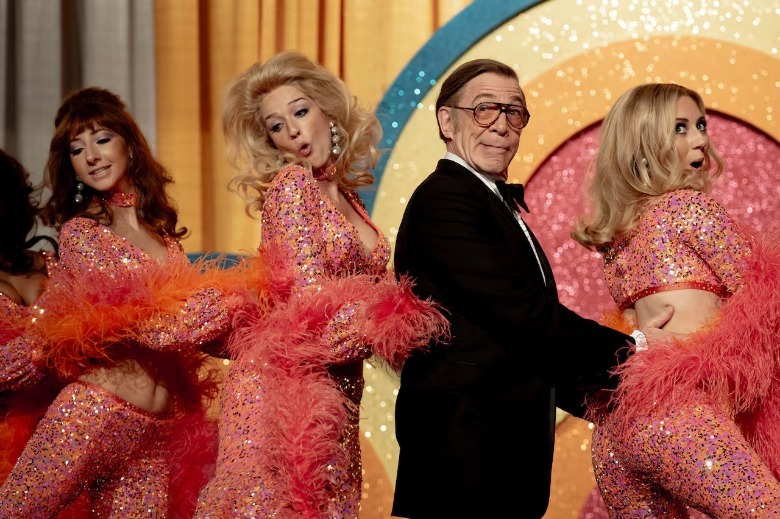Director Jason Reitman & Writer Gil Kenan Talk SNL
In “Saturday Night,” there are several amusing runners that recur throughout the movie. One of them finds writer Tom Schiller walking around the set of Studio 8H with incense. Another has Lorne Michaels’ executive assistant (and cousin) Neil Levy, played by Andrew Barth Feldman, occasionally entering a scene and providing the countdown as to how much time is left until the show airs.
Kenan: One of my favorite things about Lorne [Michaels] and Tom [Schiller] and his new age practices is that Lorne has no judgment. He spent time on the West Coast. He accepts it. In fact, he embraces it when the moment is right. Yeah, those are two examples, the Tom incense runner and the Neil Levy countdown runner are both two concepts that we just had no idea about before we interviewed both of those folks. The Neil Levy thing, we just thought we were being completists when we talked to Neil, who was Lorne’s cousin. We really felt like we were just kind of completing our mental map of who was there that night. In talking to Neil, a character just started to materialize. By the end of that interview, we realized we had something we could really use to create a sense of momentum, comic momentum for our story.
Tom’s an amazing character. I actually just revisited our interview with him. This is actually the thing about that made writing it both so thrilling and complicated. We had to make really hard choices about who to focus our energy with. Tom Schiller deserves a whole movie about him as a character. He had an incredible run on the show. He ended up sort of taking over the film segments, became the guy who created these iconic “SNL” short film concepts after the Albert Brooks era ended, ended up having a feature career. He is a real personality. Anyway, so this was one of the things is we ended up having a bounty of stories, and our job and both relying on our own experiences as filmmakers and also just starting to focus this in on Lorne was about creating a coherent and propulsive shape to it.
In addition, there’s a key moment for Lorne Michaels (Gabriel LaBelle) as a character where he has an unnerving realization about his potential future if he doesn’t get “SNL” on the air.
As we speed towards the third act of “Saturday Night” and the clock is ticking towards the live premiere of “SNL,” Lorne Michaels is left without a lightning technician. But he hears there might be a good replacement on one of the other floors of 30 Rockefeller Plaza, specifically where “The Rumpus Hour” variety show is being shot with Milton Berle (J.K. Simmons) and some dancing girls. When Michaels heads up to “The Rumpus Hour” set to recruit this lighting technician, Berle is dancing with his girls, so he’s waiting in the wings for the take to be finished so he can steal his new crew member. As he looks upon the remnants of old television, the tired formula of aging TV personalities delivering the same old thing, his gaze shifts to the show’s director, who is sitting miserably in a production chair with a cigarette in hand, staring off into the distance, not even paying attention to the show’s taping. It’s a moment where Michaels needed a boost to keep going in the face of increasingly insurmountable odds, and he rushes to snag his new lighting technician and get “Saturday Night” live on the air.
Reitman: That moment happened the day of, I was just figuring that shot out, because it’s a long shot. It takes them all the way from the elevator through the whole “Rumpus Hour,” up the stairs, and I felt like something was missing. And I thought, Oh, you know what’d be really interesting? If Lorne saw this alternate future where he saw like, “Who would he be if he didn’t stand up for himself? Who would he be if he didn’t follow his convictions?” And then the funny thing is I have to go through all the background actors and be like, “Who looks like failure?” [laughs]
Towards the end of the movie, one of the pivotal, uplifting sequences finds the entire cast and crew coming together to help complete the real brick floor that was used for the main stage. It’s a moment of unity among a group of people who have mostly been at each others’ throats throughout the evening.
Reitman: When I heard the fact that they actually laid bricks for home base — which is insane. No one would ever do that, particularly in New York, when you’re shooting on the eighth floor of an office building, why are you laying bricks? But they had an obsession with real detail. It showed the fact that none of them had ever made TV before. That the production designer came from Broadway. It was like, “Yeah, we’re going to lay real bricks,” and it seemed like an opportunity for these two generations to finally coalesce at the last second.















Post Comment